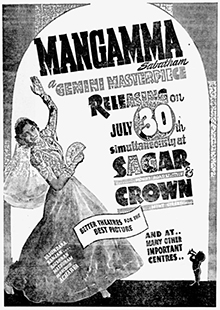1943 Indian film
| Mangamma Sabatham | |
|---|---|
 Theatrical release poster Theatrical release poster | |
| Directed by | Acharya |
| Written by | Acharya |
| Produced by | S. S. Vasan |
| Starring | |
| Cinematography | Ramnoth |
| Edited by | Chandru |
| Music by | S. Rajeswara Rao M. D. Parthasarathy |
| Production company | Gemini Studios |
| Distributed by | Gemini Studios |
| Release date |
|
| Country | India |
| Language | Tamil |
Mangamma Sabatham (transl. Mangamma's vow) is a 1943 Indian Tamil-language film, starring Vasundhara Devi, Ranjan, N. S. Krishnan and T. A. Mathuram. The film was produced by S. S. Vasan and directed by T. G. Raghavachari, credited as Acharya. The film was remade in Hindi and Telugu as Mangala (1950 and 1951) and again in Telugu as Mangamma Sapatham (1965).
Plot
| This article needs an improved plot summary. Please help improve the plot summary. (June 2022) (Learn how and when to remove this message) |
Mangamma, a village girl, is humiliated by a prince and vows to take revenge. She vows to make the prince marry her and have a child who would whip the prince in the court. However, her plans are almost foiled when the prince imprisons her when she tries to seduce him. The story revolves on how she tricks him into falling in love with her and begets a son through the prince who ultimately whips him in court.
Cast
Adapted from the song book:
- Vasundhara as Mangamma
- Ranjan as Sugunan, Jayapalan
- P. A. Subbaiah Pillai as Venkatachalam
- P. N. Seshagiri Bhagavathar as King
- P. V. Rao as Minister
- P. Appanna Iyengar as Adappakkaran
- Puliyoor Duraisami Iyer as Guard
- M. Ramamurthi as Sumathi
- A. S. Leelavathi as Rathi
- Kolathu Mani as Acrobat
- Ramasami as Sarangi
- N. S. Krishnan as Sathan
- T. A. Mathuram as Yamuna
Production
Mangamma Sabatham is the first film that N. S. Krishnan and T. A. Mathuram featured for Gemini Studios. Krishnan trained hard to do the tight-rope walking scene himself without using a double.
Soundtrack
Music was composed by S. Rajeswara Rao and M. D. Parthasarathy while the lyrics were penned by Papanasam Sivan and Kothamangalam Subbu.
| Song | Singer | Lyricist | Length |
|---|---|---|---|
| "Puththiyulla Manithar Enraal" | Vasundhara | Kothamangalam Subbu | 02:44 |
| "Anjaathae Nee Vaa" | Vasundhara | Kothamangalam Subbu | 01:41 |
| "Vanna Puraavae Nee Yaar" | Ranjan | Kothamangalam Subbu | 01:51 |
| "Aanantham Ithae" | Vasundhara | 01:53 | |
| "Ayyaiyaiya Solla Vetkamaguthae" | Vasundara | ||
| "Jayame Jayame" | Vasundara Devi | Papanasam Sivan | 02:04 |
Release and reception
Mangamma Sabatham was released on 30 July 1943. The Indian Express wrote that despite the lengthy running time, it was "a perfect artistic unit in every detail". According to historian Randor Guy, the film netted a profit of ₹4 million (equivalent to ₹610 million or US$7.1 million in 2023).
Remakes
Mangamma Sabatham was remade in Hindi in 1950 and Telugu in 1951, both titled Mangala. A Sinhala remake Mathalan was released in 1955. A second Telugu remake, Mangamma Sapatham, was released in 1965.
References
- ^ Guy, Randor (23 November 2007). "Blast from the past". The Hindu. Archived from the original on 7 October 2017. Retrieved 7 October 2017.
- ^ மங்கம்மா சபதம் (song book) (in Tamil). Gemini Studios. 1943. Archived from the original on 23 June 2022. Retrieved 21 March 2021.
- "Mangamma Sabatham". The Indian Express. 30 July 1943. p. 3. Retrieved 18 February 2021.
- "Mangamma Sabatham". The Indian Express. 7 August 1943. p. 4. Retrieved 18 February 2021.
- Guy, Randor (December 2008). "... And thus he made Chandralekha sixty years ago". Madras Musings. Vol. XVIII. Archived from the original on 24 May 2013. Retrieved 2 July 2013.
- Ranga Rao, V.A.K. "Hindi film dance". india-seminar.com. Archived from the original on 26 July 2016. Retrieved 18 February 2021.
- Rajadhyaksha & Willemen 1998, p. 323.
- Muthiah, S. (14 May 2018). "Lester and Ceylon's films". The Hindu. Archived from the original on 9 November 2020. Retrieved 18 February 2021.
Bibliography
- Rajadhyaksha, Ashish; Willemen, Paul (1998) . Encyclopaedia of Indian Cinema. British Film Institute and Oxford University Press. ISBN 0-19-563579-5.